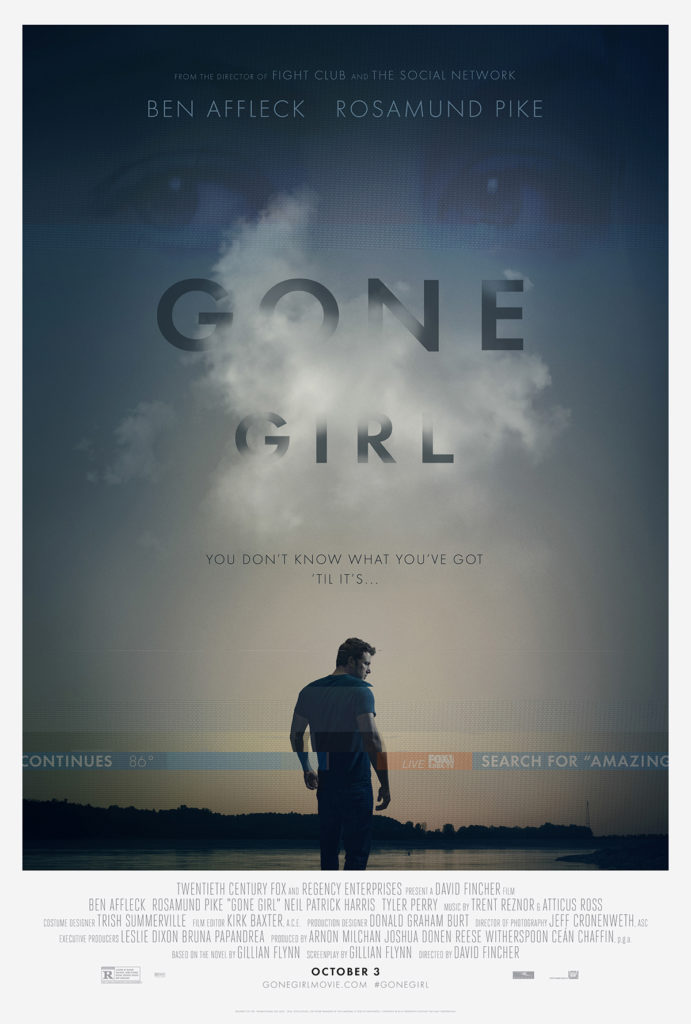By Maxim Tamarov, news editor
Disguised as detective fiction, “Gone Girl” at its core is the story of an ostensibly happy married couple that goes through a meat-grinder of lay-offs, collapsing families and power struggles—and comes out the other end as a depraved and carnivorous union of sociopaths. It is a close adaptation of the novel of the same title by Gillian Flynn. David Fincher, director of such psychological thrillers as “Fight Club,” “Se7en” and “The Game,” was the perfect candidate to bring this novel to life.
To open the film: Nick Dunne (Ben Affleck) is sharing a bourbon with a woman. Their humor is post-romantic, but the woman is quickly revealed to be his sister Margo “Go” Dunne (Carrie Coon), with whom Nick is very close and with whom he owns a bar. They talk and play LIFE while discussing life—and at the center of their discussion is marital frustration. Soon Nick is called by a neighbor who enlightens him on the fact that the Dunne cat is roaming outside. Nick rushes home to find his door open, his wife missing and his living room in disarray.
The film, like the novel from which it is adapted, juxtaposes the narratives of Nick and his wife Amy Dunne (Rosamund Pike). Amy is gone, but her voice comes to us in flashbacks with narration of her diary. Amy describes a perfect marriage with a husband of good wit and better looks, and the clever nuances that keep their relationship and eventual marriage happy—at first. Nick’s ideas on the marriage are revealed through his conversation with his sister—the one he never lies to, except sometimes. There is a lot of he-said, she-said, and if you’ve ever been the awkward mutual friend of a couple and have had to listen to both sides of a stupid argument about cleaning or going out, then you can imagine half of this movie.
In a frantic man hunt for Amy Dunne, the narrators are revealed to be more and more unreliable. Amy’s deteriorating reflections on her husband bring up memories explicitly denied by her husband, and the audience is very much convinced by the mounting evidence that Nick in fact murdered his wife and disposed of the cadaver in the nearby Mississippi River. The cops and audience are aided (or misled) by clues that Amy left for her husband to find his latest anniversary present; it is an anniversary tradition for the Dunnes: Amy hides a present and Nick tries to find it. This allows for a sort of chapter narrative, with Fincher building suspense with each clue as the audience becomes more and more deceived.
The two somewhat savvy cops Boney and Gilpin (Kim Dickens and Patrick Fugit, respectively) are given much more attention in the film than the book. Boney’s deadpan cynicism and Gilpin’s whiney cluelessness add comic relief to the dark storyline, an aspect only possible because Nick’s story is told in real time. At one point they are grilling Nick for details about his wife and disparage him for not knowing what his wife does all day and what her blood type is. As Nick walks away, Gilpin leans in to Boney and asks, “should I know my wife’s blood type?” to which she responds with a grimace and says, “no.” The detectives are foils for Nick and Amy, since, due to the nature of the developing plot, it is hard to judge their competency in police work until the film’s disturbing climax. However, the movie allows the viewer to cheer the cops on and get on board with their investigating game — they are fighting to find out the truth, as is the audience.
Affleck’s portrayal of Nick is spot-on, especially because Affleck has built his reputation on films where he is the supporting goofy laid-back guy who could possibly snap and punch you (Good Will Hunting) or murder you if need be (The Town), so it’s conceivable that he would murder his wife to get her money and live with a young beautiful concubine — just as it is conceivable that he was simply a loving husband who gave into the temptation to cheat and was being brutally punished by his psycho wife.
For she is psycho. But you only learn that later, as layer by layer of genuine loving wife are peeled from her calculating, disciplined megalomaniac persona. Amy, the daughter and inspiration of parents who plagiarized her life for a children’s book series entitled “Amazing Amy,” appears to be a confident, smart N.Y. socialite who falls in love with Nick because he tries really hard for her. When things don’t go right for Amazing Amy, she fixes them. Fixing them might involve faking sexual assault or faking a murder.
Neil Patrick Harris makes an appearance as well, as Desi Collings, Amy’s touchy and obsessive prep school boyfriend, and he nails the part. NPH is just the right amount of ingenuine romantic and classy, much like in “How I Met Your Mother,” but instead of crass, he is just creepy.
Although the novel goes into great detail on the intricacies of Amy’s plot and both characters’ experiences for the sake of character development, the film omits certain elements that frankly don’t add much (such as beating stolen catfish to death) and thus leaves the viewer with just enough explanation to be convinced. Don’t worry: all of the absurd and gory scenes still make it in the movie.
The combination of Pike’s performance of her two-faced character role and Affleck’s plasticity of his everyman character will instill an uneasiness in even the most dedicated lovers, and combined with Fincher’s embrace of the low light aesthetic, the film leaves the viewer convinced that their significant other is trying to frame them for murder.
Photo courtesy EPK.TV









